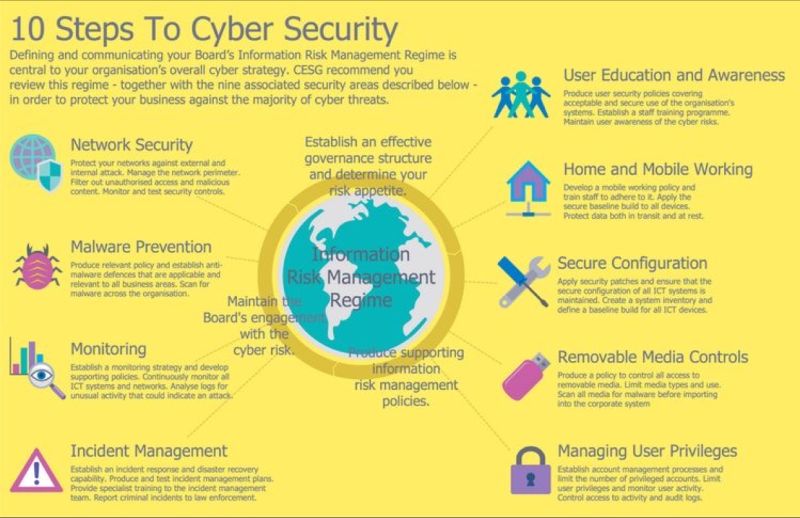Cybersecurity has become indispensable for running a successful business. With the ever-evolving nature of cyber threats and attacks, traditional cybersecurity measures such as antivirus software and firewalls are no longer enough to protect your organisation from potential breaches. It’s crucial for businesses to take a proactive approach to security to stay ahead of cybercriminals.
One effective way to enhance your cybersecurity measures is through proactive cybersecurity audits. These audits go beyond simply checking boxes on a compliance checklist; they involve a comprehensive assessment of your organisation’s security posture to identify vulnerabilities and potential areas of improvement before malicious actors can exploit them.
Understanding Modern Cybersecurity Threats
Types of Cyber Threats
Modern cybersecurity threats come in various forms, each posing unique challenges to businesses. Common types of cyber threats include:
- Malware: Malicious software designed to disrupt, damage, or gain unauthorised access to computer systems and data. Examples include viruses, ransomware, and spyware.
- Phishing: Emails, texts, or messages that appear to be from a legitimate source, tricking users into providing sensitive information or downloading malware.
Distributed Denial of Service (DDoS) attacks: Coordinated attempts to overwhelm a website or network with traffic, causing it to become unavailable to users. - Man-in-the-middle (MitM) attacks: Intercepting communication between two parties in order to steal data or inject malicious content.
- Advanced Persistent Threats (APTs): Sophisticated cyberattacks in which threat actors gain unauthorised access to a network and remain undetected for an extended period, often with the intention of stealing sensitive data or intellectual property.
The Impact of Cyber Attacks on Businesses
Cyber attacks can have devastating consequences for businesses, including:
- Financial losses: Businesses may face direct financial losses due to theft, extortion, or the need to pay ransoms. Additionally, cyber attacks can lead to indirect financial losses due to system downtime, lost productivity, and damage to reputation.
- Reputational damage: A successful cyber attack can harm a business’s reputation, leading to loss of customer trust and potential loss of business.
- Legal and regulatory penalties: Businesses that fail to adequately protect sensitive data may face legal and regulatory penalties, including fines and potential lawsuits.
- Loss of intellectual property: Cyber attacks can result in the theft of valuable intellectual property, such as trade secrets or proprietary information.
Why Traditional Cybersecurity Measures Fall Short
While traditional cybersecurity measures like antivirus software and firewalls are essential components of a robust security strategy, they are not foolproof. Cybercriminals are constantly evolving their tactics, making it necessary for businesses to adopt a more proactive approach to security.
Basic cybersecurity measures may help protect your organisation from known threats, but they often fall short when it comes to identifying and mitigating emerging threats. Without a proactive stance towards security, businesses risk falling victim to increasingly sophisticated cyber attacks.
The Benefits of Proactive Cybersecurity Audits
Proactive cybersecurity audits offer numerous benefits for businesses looking to enhance their security posture. By conducting regular audits, organisations can identify and address vulnerabilities before they are exploited, reducing the likelihood of a successful cyber attack.
One key advantage of proactive cybersecurity audits is their ability to help businesses stay ahead of emerging threats. By continuously evaluating and improving security measures, organisations can proactively mitigate potential risks and safeguard their sensitive data from cyber threats.
Furthermore, proactive cybersecurity audits can result in long-term cost savings for businesses. By preventing cyber attacks through proactive security measures, organisations can avoid the potentially devastating financial and reputational consequences of a data breach.
Video courtesy of @IBMTechnology via YouTube Videos.
Key Elements of an Effective Proactive Cybersecurity Audit
A proactive cybersecurity audit should include the following elements:
- Risk assessment: Identifying potential risks and vulnerabilities within the organisation’s digital infrastructure, including hardware, software, and human factors.
- Vulnerability scanning and penetration testing: Regularly scanning networks and applications for vulnerabilities and conducting penetration tests to identify potential weak points.
- Policy and procedure review: Evaluating existing cybersecurity policies and procedures to ensure they are up-to-date and effective in protecting against modern threats.
- Employee training and awareness programs: Providing regular training and resources to employees to help them understand and mitigate cybersecurity risks.
How Proactive Cybersecurity Audits Work
Conducting a proactive cybersecurity audit involves a comprehensive assessment of your organisation’s security infrastructure. This may include vulnerability testing, penetration testing, and security assessments to identify weaknesses and areas for improvement.
During a proactive cybersecurity audit, cybersecurity experts analyse your organisation’s systems, networks, and applications to identify potential vulnerabilities and security gaps. By simulating real-world cyber attacks, auditors can assess the effectiveness of your security measures and recommend strategies for improvement.
Businesses can use the findings from proactive cybersecurity audits to enhance their security posture and strengthen their defences against cyber threats. By implementing the recommended security measures, organisations can reduce their risk of a successful cyber attack and better protect their sensitive data.
Establishing a Cybersecurity Culture Within Your Organisation
Creating a strong cybersecurity culture within your organisation can help prevent cyber-attacks and minimise their impact. Steps to establish a cybersecurity culture include:
- The importance of executive buy-in: Ensuring that senior leadership is committed to promoting cybersecurity and providing the necessary resources and support.
- Creating a cybersecurity team or appointing a dedicated officer: Establishing a dedicated team or officer responsible for managing and coordinating cybersecurity efforts.
- Fostering an open and transparent reporting culture: Encouraging employees to report potential cybersecurity incidents or concerns without fear of reprisal.
- Continuously promoting cybersecurity awareness among employees: Regularly providing training and resources to help employees stay informed and engaged in cybersecurity efforts.
Choosing the Right Cybersecurity Solutions for Your Business
Selecting appropriate cybersecurity tools and software is essential to protecting your business from cyber threats. Considerations include:
- Selecting the appropriate cybersecurity tools and software: Choosing solutions that are tailored to your organisation’s specific needs and risk profile.
- Working with cybersecurity experts and vendors: Partnering with experienced cybersecurity professionals to evaluate and implement the best solutions for your business.
- Navigating the complexities of cybersecurity regulations and compliance: Ensuring that your cybersecurity measures adhere to relevant industry and regulatory standards.
Developing an incident response plan
An incident response plan is a critical component of proactive cybersecurity. Steps to create an effective incident response plan include:
- The purpose of an incident response plan: Establishing clear guidelines and procedures to follow in the event of a cybersecurity incident.
- Steps for creating an effective incident response plan: Identifying key stakeholders, defining roles and responsibilities, and developing communication strategies.
- Testing and reviewing your incident response plan: Regularly testing and updating the incident response plan to ensure it remains effective and relevant.
Staying up to date with the latest cybersecurity trends and best practices
Keeping informed about the latest cybersecurity threats and best practices is essential for maintaining a robust cybersecurity posture. Tips for staying up to date include:
- Regularly reviewing and updating your cybersecurity strategy: Periodically assessing and updating your cybersecurity strategy to address new threats and vulnerabilities.
- Participating in cybersecurity conferences and events: Networking with cybersecurity professionals and attending events to stay informed about the latest trends and developments.
- Networking with cybersecurity professionals and sharing knowledge: Collaborating with industry peers and experts to exchange information and insights on cybersecurity best practices.
- Subscribing to cybersecurity newsletters and industry sources: Following reputable cybersecurity publications and resources to stay abreast of emerging threats and recommended mitigation strategies.
Conclusion
As cyber threats continue to evolve and businesses increasingly rely on digital technologies, the importance of proactive cybersecurity measures cannot be overstated.
Proactive cybersecurity audits offer businesses a powerful tool to enhance their security posture, identify vulnerabilities, and mitigate potential risks before malicious actors can exploit them. By adopting a proactive stance towards security and regularly conducting cybersecurity audits, businesses can protect themselves from cyber threats, prevent potential data breaches, and safeguard their sensitive information.
Investing in proactive cybersecurity measures is not only a sound business decision but also essential for ensuring the long-term success and security of your organisation.
FAQ Corner
What is the difference between a proactive and reactive cybersecurity approach?
A proactive cybersecurity approach involves continuously identifying and addressing vulnerabilities before they can be exploited. In contrast, a reactive cybersecurity approach focuses on responding to cybersecurity incidents after they occur. A proactive approach is generally more effective at minimising the risk of cyber attacks.
How often should proactive cybersecurity audits be conducted?
The frequency of proactive cybersecurity audits depends on factors such as the size of the organisation, the complexity of its digital infrastructure, and the level of risk it faces. Organisations should generally conduct audits at least annually or more frequently if they operate in high-risk industries or handle sensitive data.
What is the role of penetration testing in a proactive cybersecurity audit?
Penetration testing simulates real-world cyber attacks on an organisation’s digital infrastructure to identify vulnerabilities and weaknesses. This helps to evaluate the effectiveness of existing security measures and identify areas for improvement. Penetration testing should be a regular component of a proactive cybersecurity audit.
How can small businesses afford proactive cybersecurity measures?
Small businesses can implement cost-effective, proactive cybersecurity measures by focusing on the most critical areas of risk, prioritising essential security tools and services, leveraging free or low-cost resources, and providing regular employee training on cybersecurity best practices. Engaging with cybersecurity experts and vendors can also help small businesses identify tailored and budget-friendly solutions.
What is the role of employee education in proactive cybersecurity?
Employee education plays a critical role in proactive cybersecurity, as many cyber attacks target human vulnerabilities rather than technical ones. Regular training and awareness programs can help employees understand and mitigate cybersecurity risks, identify potential threats, and respond appropriately in the event of a cybersecurity incident. Organisations should prioritise employee education as an essential component of a proactive cybersecurity strategy.
Is your business truly secure against evolving cyber threats?
Cybersecurity is no longer a luxury but a necessity for any organisation. Taking a proactive approach with regular cybersecurity audits can help you stay ahead of cybercriminals and safeguard your sensitive data. Don’t wait until it’s too late!
Discover how Flywheel IT Services can help fortify your organisation’s cybersecurity measures. Our expert team will work with you to identify vulnerabilities and develop a tailored strategy to protect your business from cyber threats.




